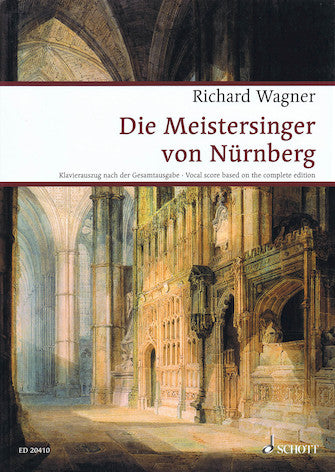
Hal Leonard
Wagner Die Meistersinger von Nürnberg
Composer: Richard Wagner
Editor: Egon Voss
Publisher: Schott
Publisher Code: ED20410
Instrumentation: Voice
Format: Vocal Score
Wagner Die Meistersinger von Nürnberg
Juilliard Store
144 West 66th Street
New York NY 10023
United States
Choose options
Wagner Die Meistersinger von Nürnberg
Juilliard Store
144 West 66th Street
New York NY 10023
United States
Wagner Die Meistersinger von Nürnberg
Juilliard Store
144 West 66th Street
New York NY 10023
United States
The Master Singers of Nuremberg
“Die Meistersinger von Nürnberg is today still considered a German festival and national opera: this evaluation is borne out by the opera’s performance history, the history of its reception and customary performance practice. Critical minds will perhaps recall the quotation from Friedrich Nietzsche’s publication "Jenseits von Gut und Böse" [Beyond Good and Evil] in which the Vorspiel [Prelude] to Meistersinger is described as ‘magnificent, ornate and ponderous art’ and Wagner’s music in general as being ‘rough and coarse’. This music according to Nietzsche possesses ‘no trace of the fine southern clarity of the sky and nothing of grace’, but instead ‘a cumbersome garb, with a touch of licentious barbarism and solemnity’ and ‘even a certain degree of ungainliness’. Nietzsche’s evaluation is regarded by many as an insight into the essence of the matter, although it is evident that Nietzsche was exaggerating in order to be provocative. What is more important today is however that this characterisation appears to have been the result of an approach to the performance of Meistersinger which had neglected or even gone as far as to misappropriate elements of this work. This is also the conclusion reached in the Meistersinger Edition of the Critical Complete Edition of the Musical Works of Richard Wagner (Richard Wagner, Sämtliche Werke, Vol. 9, I-III, edited by Egon Voss, Mainz 1979-1987). It has in fact been established that the first print of the score published by B. Schott’s Söhne in Mainz in 1868 contained numerous errors and omissions, particularly with regard to dynamic markings and articulation. The difference between staccato dots and dashes which has an influence on the tone was simply ignored. The substantial omission of these staccato markings unambiguously draws attention to the fact that Wagner intended a lighter-weight sound than was produced in adherence the first edition. The same also holds true for the dynamic markings which were submitted to a general levelling process in the first edition, thereby entirely masking their original broad scope of differentiation. […] When the saying ‘the music sets the tone’ is cited, it is in actual fact tempo, dynamics which are implied. If the new findings incorporated into the Meistersinger edition of the Critical Complete Edition are taken seriously, this will inevitably produce a new Meistersinger sound.” (Egon Voss, quoted from the foreword of the new Meistersinger vocal score; translated by Lindsay Chalmers-Gerbracht)
